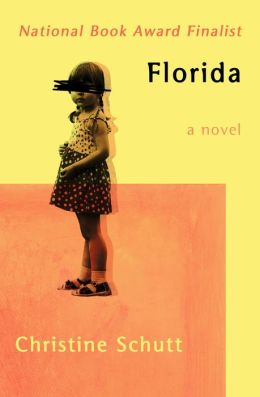While reading this, I suffered from a keen sense of déjà vu.
"Now where have I come across similar prose?"
Then I dredged up from memory, my feelings about Offred's nearly toneless, emotionally detached, subtly traumatized voice in The Handmaid's Tale.
The protagonist, Alice Fivey's voice shares stark similarities with Offred's, in the way it drips with a resignation to fate and acute despair. There's nothing much lyrical about the prose of THT as opposed to the prose-poem like structure of Florida, but there's the note of desolation and suppressed grief palpable in both the narrator voices.
While I liked THT extremely because of the brilliant extrapolation of facts concerning present trends on misogyny, Alice Fivey's rather blandly narrated tale of grappling with abandonment issues left me cold and unaffected.
And the thing is I am not a big fan of this kind of writing characterized by awkward, stumpy sentences which must be the polar opposite of Proustian prose. In fact, it grates on my nerves. My brand of poetic prose would be Anaïs Nin's, Virginia Woolf's in pretty much every one of her books or Toni Morrison's in Beloved. Sorry Christine Schutt, but your prose doesn't seem all that poetic to me.
Alice Fivey is an orphaned child who lost her father to a car accident. A few years later her mother falls victim to a mental illness and has to be institutionalized as a result of which Alice becomes homeless, reduced to the state of temporary live-in arrangements with a set of unsympathetic relatives.
The reader is led through her growing years in the midwest, where she is shown rather implicitly to suffer from profound loneliness, her dreams of a laughter-filled life with her parents in Florida shattered to bits. Her isolation is so pronounced that only the company of her family chauffeur Arthur, whom Alice comes to view as a kind of father figure, seems to provide her with a degree of comfort. Arthur becomes the only person who doesn't treat her unkindly or make thoughtless remarks regarding her mother the way her Aunt Frances and Uncle Billy do.
There are certain sentences containing heart-breaking implications of Alice's sense of hurt and subdued anger at her mother's 'betrayal'.
This one really stabbed me in a rather sensitive spot. But barring a few instances like the sentences I quoted above, Alice's story didn't achieve any kind of high emotional resonance. More often than not, the monotony of reading similarly structured sentences crept in unnoticed and I found myself trying to glide over them with a fluid grace in an effort to finish the book soon and move on to better reads.
3.5 stars out of 5.
P.S.:- My slightly negative review notwithstanding, this novella was a finalist for the National Book Award in 2004 so it could be worth a shot after all.

"Now where have I come across similar prose?"
Then I dredged up from memory, my feelings about Offred's nearly toneless, emotionally detached, subtly traumatized voice in The Handmaid's Tale.
The protagonist, Alice Fivey's voice shares stark similarities with Offred's, in the way it drips with a resignation to fate and acute despair. There's nothing much lyrical about the prose of THT as opposed to the prose-poem like structure of Florida, but there's the note of desolation and suppressed grief palpable in both the narrator voices.
While I liked THT extremely because of the brilliant extrapolation of facts concerning present trends on misogyny, Alice Fivey's rather blandly narrated tale of grappling with abandonment issues left me cold and unaffected.
And the thing is I am not a big fan of this kind of writing characterized by awkward, stumpy sentences which must be the polar opposite of Proustian prose. In fact, it grates on my nerves. My brand of poetic prose would be Anaïs Nin's, Virginia Woolf's in pretty much every one of her books or Toni Morrison's in Beloved. Sorry Christine Schutt, but your prose doesn't seem all that poetic to me.
Alice Fivey is an orphaned child who lost her father to a car accident. A few years later her mother falls victim to a mental illness and has to be institutionalized as a result of which Alice becomes homeless, reduced to the state of temporary live-in arrangements with a set of unsympathetic relatives.
"I was ten - ten was my age when Mother left for good, and this sleep-over life began."
The reader is led through her growing years in the midwest, where she is shown rather implicitly to suffer from profound loneliness, her dreams of a laughter-filled life with her parents in Florida shattered to bits. Her isolation is so pronounced that only the company of her family chauffeur Arthur, whom Alice comes to view as a kind of father figure, seems to provide her with a degree of comfort. Arthur becomes the only person who doesn't treat her unkindly or make thoughtless remarks regarding her mother the way her Aunt Frances and Uncle Billy do.
"No one was there to think he was my father, so I could love him as I might a father."
There are certain sentences containing heart-breaking implications of Alice's sense of hurt and subdued anger at her mother's 'betrayal'.
"Mother, or the woman who said she was my mother, settled in California, finally."
This one really stabbed me in a rather sensitive spot. But barring a few instances like the sentences I quoted above, Alice's story didn't achieve any kind of high emotional resonance. More often than not, the monotony of reading similarly structured sentences crept in unnoticed and I found myself trying to glide over them with a fluid grace in an effort to finish the book soon and move on to better reads.
3.5 stars out of 5.
P.S.:- My slightly negative review notwithstanding, this novella was a finalist for the National Book Award in 2004 so it could be worth a shot after all.


No comments:
Post a Comment